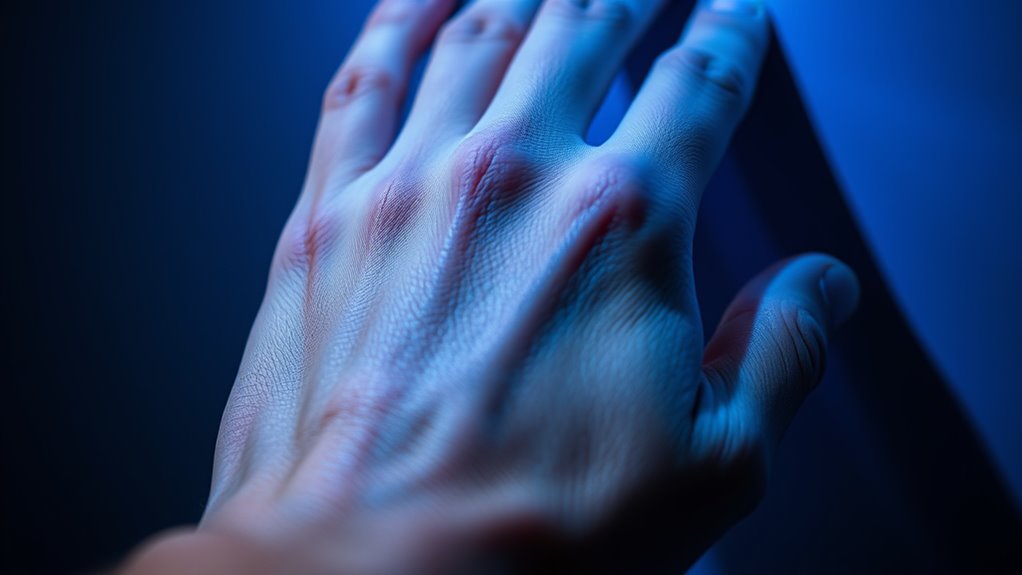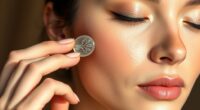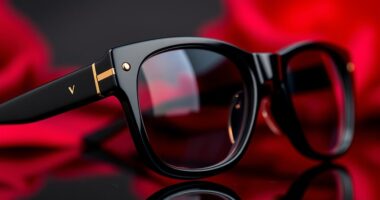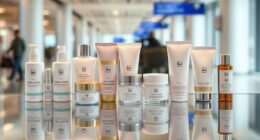Blue light from screens can actually contribute to skin aging by penetrating deep into your skin, creating free radicals that damage collagen and elastin, which keeps your skin firm and elastic. Prolonged exposure may lead to wrinkles, sagging, and pigmentation issues, especially if you’re not taking protective steps. While blue light therapy can treat skin issues under professional guidance, typical device use poses some risks. Understanding how blue light affects your skin helps you take better care—if you want to learn more, keep going.
Key Takeaways
- Blue light penetrates skin deeply, generating free radicals that can accelerate aging signs like wrinkles.
- Therapeutic blue light treatments are controlled, but prolonged exposure from screens is low-intensity and generally insufficient for healing.
- Blue light can cause skin pigmentation, dark spots, and hyperpigmentation, especially in darker skin tones.
- Using antioxidants, broad-spectrum sunscreens, and limiting screen time can help protect skin from blue light damage.
- Current evidence suggests blue light from devices may contribute to skin aging and discoloration over time, but more research is needed.
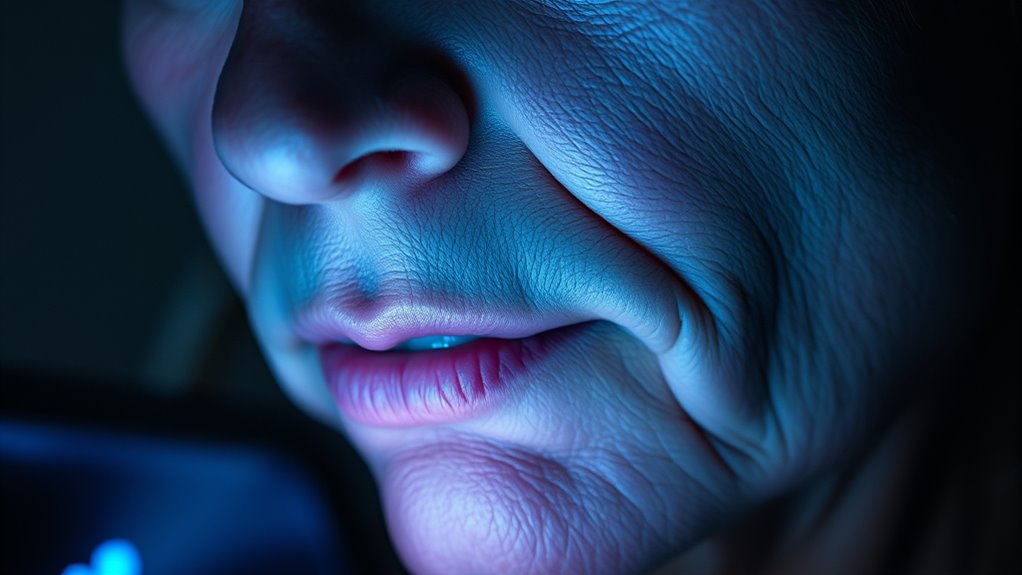
While blue light from screens and digital devices is often praised for its role in boosting alertness, research shows it may also accelerate skin aging. You might have heard about blue light therapy as a skincare treatment, but its effects on your skin are more complex than just benefits. Blue light therapy is sometimes used to target acne and skin conditions, but when it comes to daily exposure from your phone or computer, the impact on skin pigmentation and aging deserves attention.
Prolonged exposure to blue light can penetrate deep into your skin layers, generating free radicals that damage skin cells. This oxidative stress can break down collagen and elastin, the proteins responsible for firmness and elasticity. Over time, this contributes to fine lines, wrinkles, and sagging, making your skin look older than it is. Additionally, blue light exposure can trigger uneven skin pigmentation, leading to dark spots and hyperpigmentation, especially if you already have a tendency toward skin discoloration. This effect can be particularly problematic if you have darker skin tones, where pigmentation changes are more visible and harder to treat.
Blue light can damage skin cells, causing aging and pigmentation issues over time.
You might consider blue light therapy as a way to improve skin conditions, but it’s essential to understand its limitations and risks. While controlled blue light therapy might help reduce acne-causing bacteria, the blue light from screens is a different matter. The intensity and duration of exposure from devices are usually insufficient for significant therapeutic effects but enough to cause damage over time. The concern is that continuous, everyday exposure can accelerate skin aging, especially if you don’t take protective measures.
To protect your skin, it’s wise to limit screen time, especially before bed, and use skincare products with antioxidants that combat free radicals. Applying broad-spectrum sunscreens during the day can also help block some of the blue light’s harmful effects, even indoors. Some skincare brands now offer products formulated with ingredients that specifically shield your skin from blue light-induced oxidative stress. Moreover, understanding the role of light in skin health can help you make more informed decisions about your skincare routine and exposure habits.
Frequently Asked Questions
Can Blue Light Cause Immediate Skin Damage or Only Long-Term Effects?
When asking if blue light causes immediate skin damage or only long-term effects, you should know that blue light can trigger photoreactive reactions that lead to oxidative stress. These processes damage skin cells over time, but they don’t usually cause instant harm. While you might not see immediate signs, repeated exposure can accumulate damage, increasing your risk for premature aging and other skin issues in the long run.
Are There Specific Skin Types More Vulnerable to Blue Light Aging?
Imagine your skin as a garden; some plants are more sensitive and prone to damage. If you have sensitive skin, you’re more vulnerable to blue light’s effects, especially pigmentation vulnerability. Fairer skin tones tend to be more reactive, like delicate flowers, making them more prone to aging signs. So, yes, specific skin types, particularly sensitive and lighter skin, face higher risks of blue light-induced aging.
How Does Blue Light Exposure Compare to UV Damage in Skin Aging?
You might wonder how blue light compares to UV damage in skin aging. While UV rays cause more immediate and visible harm, blue light can also contribute by generating free radicals, which antioxidants can neutralize. Protecting your skin barrier helps reduce blue light effects, but it’s essential to use proper skincare and antioxidants to strengthen your defenses. Overall, blue light’s impact is less severe but still worth considering in your skincare routine.
Do All Screens Emit Enough Blue Light to Affect Skin Health?
Think of blue light like sunlight—some screens emit enough to penetrate your skin, especially with high brightness settings. Not all screens are equal; newer devices have built-in filters, reducing blue light exposure. While your phone or laptop might seem harmless, prolonged exposure with high screen brightness can increase skin penetration. So, it’s wise to manage screen brightness and consider blue light filters if you’re concerned about skin health.
Are There Effective Skincare Products That Block Blue Light?
You’re wondering if there are effective skincare products that block blue light. Yes, blue light blockers in skincare formulations can help protect your skin from potential damage. These products often contain ingredients like antioxidants and zinc oxide that shield against blue light exposure. Look for labels indicating blue light protection, and incorporate these into your routine for added defense, especially if you spend lots of time in front of screens.
Conclusion
Ultimately, don’t let the hype scare you, but stay informed. While blue light may contribute to skin aging, it’s not the sole culprit. Protect your skin by using broad-spectrum sunscreens and practicing good skincare habits. Remember, Rome wasn’t built in a day, and skincare takes consistent effort. Stay cautious, but don’t panic—knowledge is power, and a balanced approach keeps your skin healthy and resilient over time.

